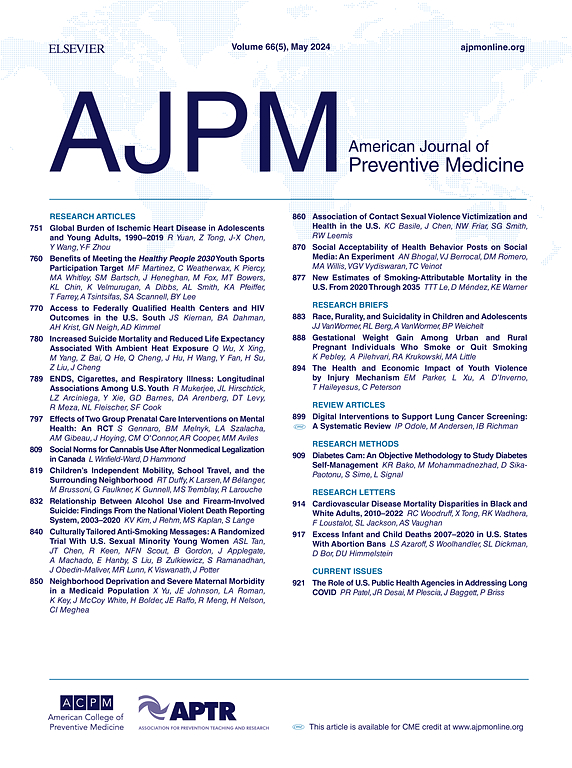一项试点试验,以支持卫生保健提供者促进有智力和发育障碍的个人接种疫苗。
IF 4.3
2区 医学
Q1 MEDICINE, GENERAL & INTERNAL
引用次数: 0
摘要
患有智力和/或发育障碍(I/ dd)的个体在疫苗获取、吸收和信心方面遇到障碍,导致卫生不公平。这些障碍包括与保健提供者有效处理健康的社会决定因素、提供可获得的针头程序以及翻译和传播包容性公共卫生信息的能力有关的障碍。目前的研究旨在测试虚拟继续医学教育(CME)课程在提高医疗保健提供者解决这些障碍的能力方面的初步有效性。该CME在网上免费提供。参与者包括120名医疗保健提供者(医生:45%;护士:37%;其他学习者:18%)在内科,家庭实践和相关学科。基于对患者和提供者的视频访谈而创建的cme侧重于影响疫苗摄取/获取/信心的因素(模块1);增加疫苗接收的战略(模块2);和包容性公共卫生传播(模块3)。前后调查评估自我报告的理解,信心和能力。完成继续教育后,学习者在应对健康的社会决定因素方面更有可能报告更高的理解、信心和能力(模块1);解决疫苗获取/吸收/信心方面的障碍(模块2);并参与有效的公共卫生沟通(模块3)。研究结果支持短期医疗保健提供者培训这一主题的效用。未来的研究应评估长期影响,并确定为这一人群创建标准化医学课程的机会。本文章由计算机程序翻译,如有差异,请以英文原文为准。
A Pilot Test to Support Healthcare Providers in Promoting Vaccine Uptake Among Individuals With Intellectual and Developmental Disabilities
Individuals with intellectual and/or developmental disabilities encounter barriers to vaccine access, uptake, and confidence, leading to health inequities. These include barriers related to healthcare provider capacity to effectively address the social determinants of health, provide accessible needle procedures, and translate and disseminate inclusive public health information. The current study aimed to test the preliminary effectiveness of a virtual continuing medical education (CME) course on enhancing healthcare provider capacity to address these barriers. This CME was available free-of-charge online. Participants included 120 healthcare providers (physicians: 45%; nurses: 37%; and other learners: 18%) in internal medicine, family practice, and related disciplines. The CME—created based on video interviews with patients and providers—focused on factors that affect vaccine uptake/access/confidence (Module 1); strategies to increase vaccine receipt (Module 2); and inclusive public health communication (Module 3). The pre–post survey assessed self-reported understanding, confidence, and abilities. Following CME completion, learners were significantly more likely to report higher understanding, confidence, and abilities in responding to the social determinants of health (Module 1); addressing barriers to vaccine access/uptake/confidence (Module 2); and engaging in effective public health communication (Module 3). Findings support the utility of short-term healthcare provider trainings on this topic. Future research should evaluate longer-term impacts and identify opportunities to create standardized medical curricula for this population.
求助全文
通过发布文献求助,成功后即可免费获取论文全文。
去求助
来源期刊

American Journal of Preventive Medicine
医学-公共卫生、环境卫生与职业卫生
CiteScore
8.60
自引率
1.80%
发文量
395
审稿时长
32 days
期刊介绍:
The American Journal of Preventive Medicine is the official journal of the American College of Preventive Medicine and the Association for Prevention Teaching and Research. It publishes articles in the areas of prevention research, teaching, practice and policy. Original research is published on interventions aimed at the prevention of chronic and acute disease and the promotion of individual and community health.
Of particular emphasis are papers that address the primary and secondary prevention of important clinical, behavioral and public health issues such as injury and violence, infectious disease, women''s health, smoking, sedentary behaviors and physical activity, nutrition, diabetes, obesity, and substance use disorders. Papers also address educational initiatives aimed at improving the ability of health professionals to provide effective clinical prevention and public health services. Papers on health services research pertinent to prevention and public health are also published. The journal also publishes official policy statements from the two co-sponsoring organizations, review articles, media reviews, and editorials. Finally, the journal periodically publishes supplements and special theme issues devoted to areas of current interest to the prevention community.
 求助内容:
求助内容: 应助结果提醒方式:
应助结果提醒方式:


